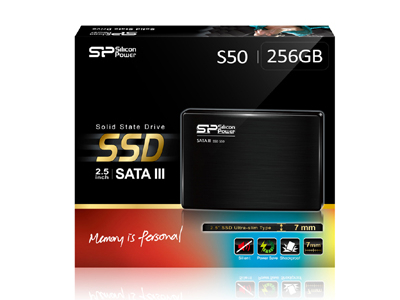Silicon Power Adds New Addition to Slim SSD Series
Silicon Power has introduced the Slim S50 SSD packing an unnamed controller that is "unlike any other solution on the market".
Silicon Power said on Tuesday said that it has added a new model to its line of 7-mm 2.5-inch Slim Series of SSDs. Called the Slim S50, it supposedly packs an all new controller that is "unlike any other solution in the market". Coupled with the latest firmware and advanced controller circuit design, the company said the SSD enables stable IOPS performance under an extended period.
The specifications provided by Silicon Power don't really offer any insight into the controller aspect, only that the SSD provides read speeds up to 530 MB/s and (seemingly slow) write speeds up to 200 MB/s via a SATA 3 (6 Gb/s) connection. The drive has been implemented with ECC technology to guarantee reliable data transmissions, and support for both TRIM and Garbage Collection technology.
"The SP S50 is more reliable and durable than tradition hard drives," the company said. "Weighing only 63 grams with a mere 7-mm thickness, the S50 is one of the lightest of its kind and is the ideal solution for users looking to upgrade their ultra slim notebook and desktop."
Silicon Power said the SSD is NCQ and RAID ready, and features a built-in SMART monitoring system. The drive itself measures 100- x 69.85- x 85-mm, and comes in four capacities: 32 GB, 64 GB, 128 GB and 256 GB. It's also backed by a three-year warranty, and is also both anti-vibration (20G) and shockproof (1500G Max), the company said.
So far the drive hasn't shown up on Silicon Power's list of retailers (Amazon, Newegg etc), so stay tuned for pricing and availability.
Contact Us for News Tips, Corrections and Feedback
Get Tom's Hardware's best news and in-depth reviews, straight to your inbox.

Kevin Parrish has over a decade of experience as a writer, editor, and product tester. His work focused on computer hardware, networking equipment, smartphones, tablets, gaming consoles, and other internet-connected devices. His work has appeared in Tom's Hardware, Tom's Guide, Maximum PC, Digital Trends, Android Authority, How-To Geek, Lifewire, and others.
-
danwat1234 "the company said the SSD enables stable IOPS performance under an extended period." "write speeds up to 200 MB/s"Reply
Yawn. Either try to be an Enterprise SSD like the Intel S3700 with consistent I/O and mediocre performance, or aim for high performance workstation and decent I/O longevity/garbage collectioning, don't try to do both! That makes for a boring, pointless drive. If the use of the drive is constant writes then use an Enterprise drive. If the use of the drive is for a hardcore computer user then use a high end consumer drive which will garbage collect when you aren't thrashing it.
It's like making an expensive hybrid luxury car that goes 0-60 in 11 seconds (luxury hybrids are fast), or an expensive sport's car that has little HP but lots of torque.
But if this drive is cheaper than other consumer SSDs... -
WithoutWeakness danwat1234"the company said the SSD enables stable IOPS performance under an extended period." "write speeds up to 200 MB/s"Reply
*snip*I've got to agree with you here. This seems like it's marketed a drive with enterprise-class consistency that is aimed at the consumer sector. It's an odd little niche that doesn't really exist. Very few consumers worry about consistent, sustained reads/writes, mainly because most people don't run their SSD's at full capacity and pure IOPS and good garbage collection deliver a superior experience for an end-user.
I'm not sure how they expect to handle consistent writes for extended periods without ANY over-provisioning on these drives. Enterprise-class SSD's deliver such consistent results by taking a large percentage (~28%) of their capacity and setting it aside as spare area for active garbage collection and wear leveling once the drive nears it's max capacity. That's why you'll see them sold as 100GB, 200GB, etc. They take that 128GB, 256GB, etc. and reserve 28% for the drive to use as spare area. This drive presents the whole 256GB to the user; nothing is set aside for over-provisioning. The controller likely does some tricky work to keep write speeds consistent without that spare area but in doing so it's probably the reason the write speeds are less than half of what you'll find on most SATA 6Gb/s SSD's. -
Pherule So how many IOPS does it have again? I don't care about read/write speed. All SSD's these days have fast read/write. I care about high IOPS.Reply
